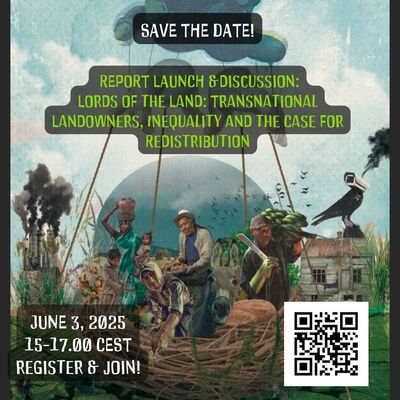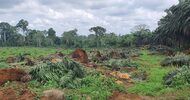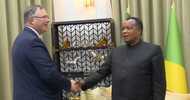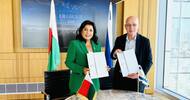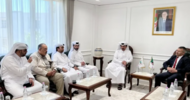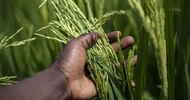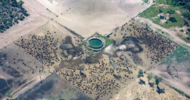Reuters | Sunday March 29 2009
Consortium eyes 70 million riyal investment in Egypt
Expected to start investment in Sudan, Ethiopia this yr
RIYADH, March 29 (Reuters) - A consortium of Saudi agricultural companies is looking to invest 150 million riyals ($40 million) into food production in Africa, the Agriculture Ministry said on Sunday.
Food security has topped the policy agenda in the Gulf Arab region following rampant inflation in 2008 that underscored the peninsula's dependence on imports and forced countries to invest abroad to ensure supplies of staples like rice and wheat.
The consortium, called Jenat, was set up to lead farm investments abroad for a group of local companies, the ministry said in a newsletter published on Sunday.
The firms include Tabuk Agricultural Development Co (Tadco), dairy firm Almarai, Food Products Co and Aljouf Agricultural Development Co, the newsletter said.
Jenat has already launched a 70 million riyals project to plant barley, wheat and livestock feed in a 10,000 hectares of farm land in Egypt, the newsletter quoted as saying Jenat's board chairman Mohammed Al-Rajhi.
"Our future aim ... is to go to Sudan and Ethiopia," he said. Jenat plans to invest 80 million riyals in the two countries, he added without elaborating.
"We expect to start this (Sudan and Ethiopia) project this year," Rajhi said.
Saudi Arabia has urged companies to invest in farm projects abroad after deciding last year to reduce wheat production by 12.5 percent per year, abandoning a 30-year-old programme to grow its own, which achieved self-sufficiency but depleted the desert kingdom's scarce water supplies.
The decision has forced many local agricultural companies, which has been growing wheat for the domestic market, to explore alternatives to compensate the resulting drop in their revenues.
State-owned Saudi Industrial Development Fund is granting financing facilities to firms exploring agricultural investments abroad.
A food security panel, affiliated to Riyadh's Chamber of Commerce and Industry, has identified wheat, barley, corn, soybean, maize, rice and sugar among strategic crops that should constitute priorities for foreign investments, a spokesman said.
Saudi investors have launched agricultural projects in Indonesia worth $1.3 billion last year, Mohamed Abdulkader al-Fadel, who chairs Saudi Arabia's Commerce and Industry Chambers Council, said earlier this month.
Tadco said earlier this month that it was "looking into joint-venture proposals from firms abroad and mulls relocating some of its activities to countries offering comparative incentives for investment".
The world's largest oil exporter said in January it had received the first batch of rice to be produced abroad by local investors as part of the King Abdullah Initiative for Saudi Agricultural Investment Abroad. (Reporting by Souhail Karam, Editing by Thomas Atkins and Rupert Winchester)
Consortium eyes 70 million riyal investment in Egypt
Expected to start investment in Sudan, Ethiopia this yr
RIYADH, March 29 (Reuters) - A consortium of Saudi agricultural companies is looking to invest 150 million riyals ($40 million) into food production in Africa, the Agriculture Ministry said on Sunday.
Food security has topped the policy agenda in the Gulf Arab region following rampant inflation in 2008 that underscored the peninsula's dependence on imports and forced countries to invest abroad to ensure supplies of staples like rice and wheat.
The consortium, called Jenat, was set up to lead farm investments abroad for a group of local companies, the ministry said in a newsletter published on Sunday.
The firms include Tabuk Agricultural Development Co (Tadco), dairy firm Almarai, Food Products Co and Aljouf Agricultural Development Co, the newsletter said.
Jenat has already launched a 70 million riyals project to plant barley, wheat and livestock feed in a 10,000 hectares of farm land in Egypt, the newsletter quoted as saying Jenat's board chairman Mohammed Al-Rajhi.
"Our future aim ... is to go to Sudan and Ethiopia," he said. Jenat plans to invest 80 million riyals in the two countries, he added without elaborating.
"We expect to start this (Sudan and Ethiopia) project this year," Rajhi said.
Saudi Arabia has urged companies to invest in farm projects abroad after deciding last year to reduce wheat production by 12.5 percent per year, abandoning a 30-year-old programme to grow its own, which achieved self-sufficiency but depleted the desert kingdom's scarce water supplies.
The decision has forced many local agricultural companies, which has been growing wheat for the domestic market, to explore alternatives to compensate the resulting drop in their revenues.
State-owned Saudi Industrial Development Fund is granting financing facilities to firms exploring agricultural investments abroad.
A food security panel, affiliated to Riyadh's Chamber of Commerce and Industry, has identified wheat, barley, corn, soybean, maize, rice and sugar among strategic crops that should constitute priorities for foreign investments, a spokesman said.
Saudi investors have launched agricultural projects in Indonesia worth $1.3 billion last year, Mohamed Abdulkader al-Fadel, who chairs Saudi Arabia's Commerce and Industry Chambers Council, said earlier this month.
Tadco said earlier this month that it was "looking into joint-venture proposals from firms abroad and mulls relocating some of its activities to countries offering comparative incentives for investment".
The world's largest oil exporter said in January it had received the first batch of rice to be produced abroad by local investors as part of the King Abdullah Initiative for Saudi Agricultural Investment Abroad. (Reporting by Souhail Karam, Editing by Thomas Atkins and Rupert Winchester)


